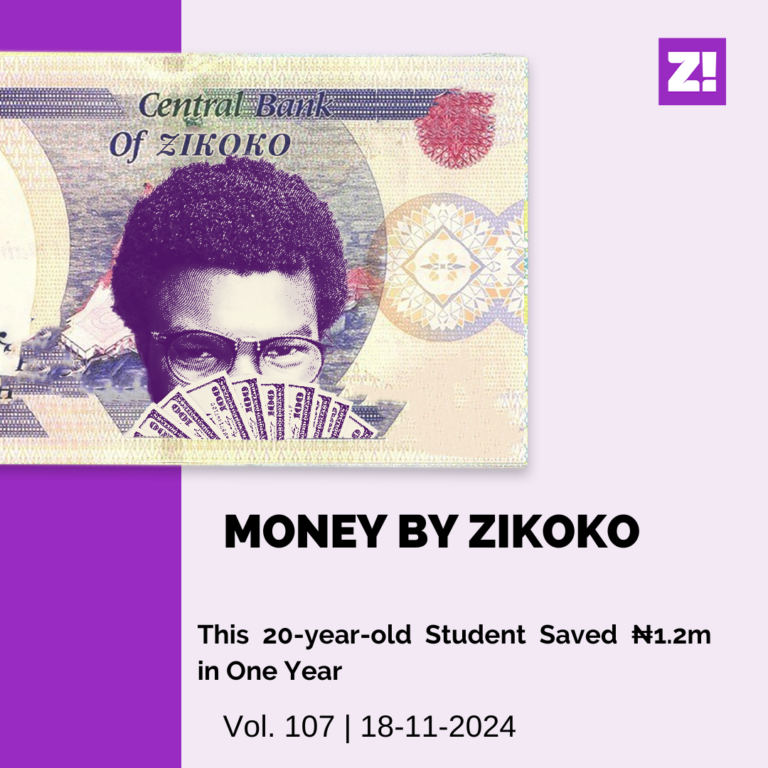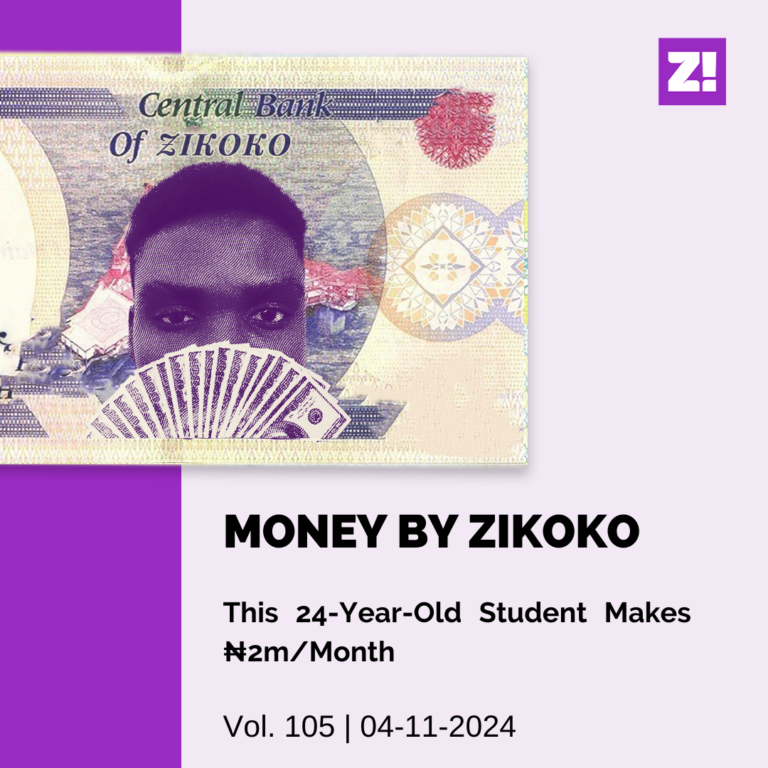Every week, Zikoko seeks to understand how people move the Naira in and out of their lives. Some stories will be struggle-ish, others will be bougie. All the time, it’ll be revealing.
This #NairaLife is a little strange. She earns enough to meet her needs. The only problem is, she’s dealing with some regrets, especially with her financial decisions in the past 10 years.
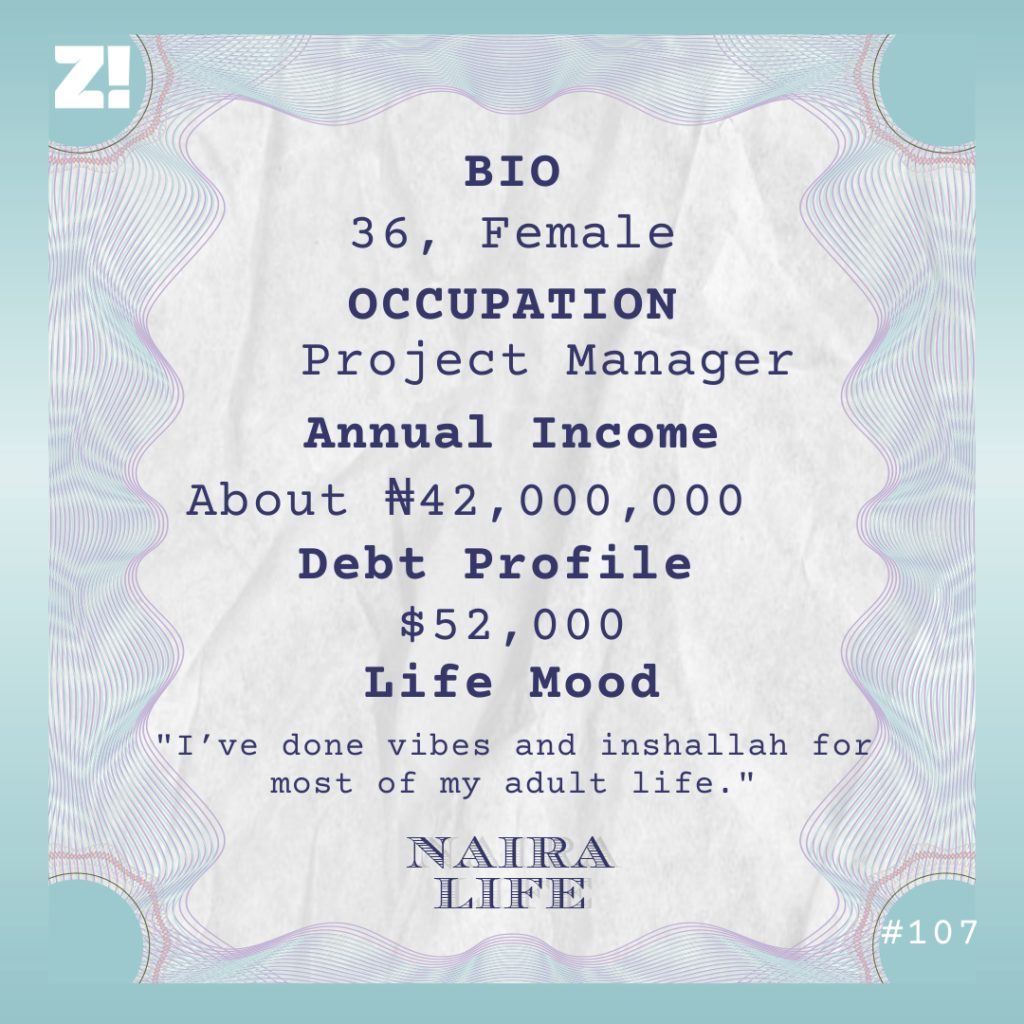
What’s your oldest memory of money?
In 1994, I got admitted to secondary school. My dad took me on a tour of the school, and I liked it so much my heart was set on the place. Then one of my dad’s friends came to our house and said something like, “If you send this one to this school, what school will her siblings go to?” I have four siblings, and the tuition was ₦10k at the time. My dad looked at the long term implications and decided that he couldn’t afford the fees. I went to a government school instead.
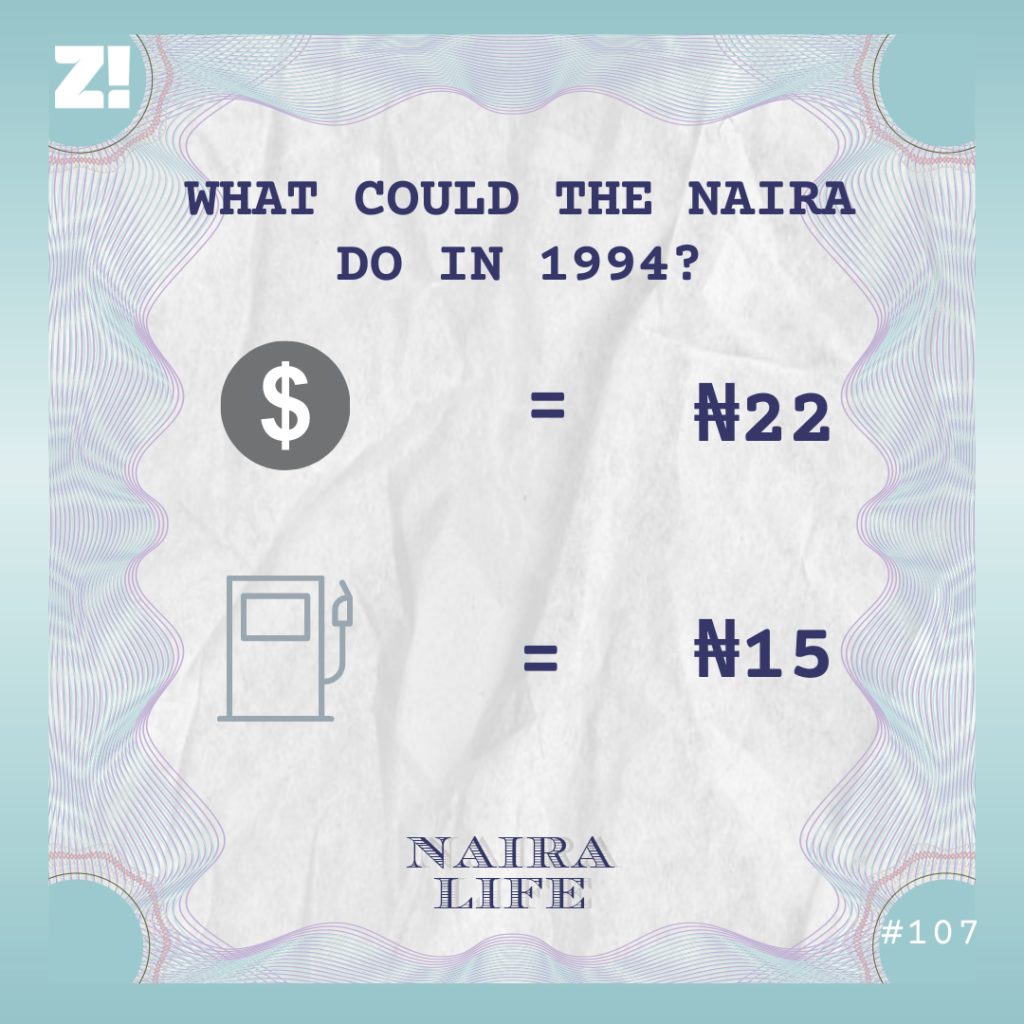
What was that like for you?
I was just like, “What the hell?” It didn’t help that I didn’t like my new school very much. I transferred to a different school after three years — another government secondary school.
The difference between both schools, however, were the kind of people who went there. My new school was filled with wealthy people and the military governor’s kids. It was insane the amount of wealth I saw there. They went on summer vacations abroad and all of that stuff. I felt so close to wealth, but I felt far away from it. When they started talking about going to uni abroad, I also went to tell my parents that I’d like to go to the US for school. My dad didn’t shut me down. He said, “Take the SATs and A-Levels, but also take JAMB.” I was like, “If I’m going to America, why do I need JAMB?”
LMAO. What did your parents do for a living?
My dad worked in the civil service and retired as a director. I don’t know how much money he had, but I don’t think he wasn’t earning a lot. He told me years later that he did a lot of side jobs, mostly consultancy gigs. My mum was a managerial staff in an insurance company. They both carried the financial load of the family.
So, did you leave Nigeria for uni?
Not for my first degree. JAMB won. I was offered Law at a university in the southwest in 2001. My dad didn’t want me cooking or working, so he put me on a couple of allowances. There was an allowance for food and another one for my upkeep. Everything was up to ₦10k per month.
For the first three years, the money came on time. But sometime in my fourth year in 2006, there was a radical shift. The money started coming in late. Sometimes, I wouldn’t get anything for two months. I didn’t know what was happening. Thinking about it now, he must have been going through a rough patch. Also, he was close to retirement at the time, so maybe there were other priorities.
That was a change from what you were used to. What did that mean for you?
It wasn’t that bad. My mum picked up some of the slack and supported me. Also, I picked up a catering side gig and started cooking for my friends’ birthdays and other small events. This didn’t bring a lot of money — maybe ₦1k or ₦2k every once in a while. Although money from my dad became irregular, I didn’t really feel the heat.
After I finished uni, I went to law school. At the time, I was dating someone who worked in an oil and gas company. Whatever my parents couldn’t do, he did it. Money almost became an infinite resource to me. All it took was a phone call.
Interesting. What happened after law school?
I went to serve in the north. After two months, I got a job at a law firm and returned home. During the interview, they asked me how much I wanted, and I said ₦30k. They looked at themselves, and one of them said, “We pay our corpers ₦120k per month.”
Omo.
This was November 2008; it was also when I realised that my dad’s day job didn’t pay him a lot. When he saw my offer letter, he was like, “This was my salary when I was an assistant director.” I was looking at him, wondering how he had been raising a family.
Anyway, after my service year ended, the law firm increased my salary to ₦135k. I didn’t have a lot of expenses. I was living with my parents, so all I had to worry about was transportation and food. I still wanted to study in the US, and I started putting some money away for that. I was at the job from 2008 until August 2010 when I left for the US.
How did it happen?
I won the visa lottery.
Whoa. Back it up now.
I applied for it in 2009. I just filled out an application online, and that was it. A year and a half later, I got a notification that I’d been selected in the lottery. What followed was this massive paperwork and an interview. I got my immigrant visa in February 2010. But there was a problem.
What was that?
My dad didn’t want me to leave. He thought I was on a well-defined career trajectory in Nigeria and didn’t understand why I wanted to leave that to go and “wash plates in the US”. He believed everyone who migrated had to resort to menial jobs to survive. We had a huge fight.
I knew the best way to convince him to let me go was to make it about going to school, not the lottery. So, I applied to 10 schools in the US. I think each application cost $75. Remember the boyfriend I talked about earlier? He paid for it. I got into three, and one of them was my dream school. The tuition was $50k, but I got a part scholarship and had to pay only $20k. In August 2010, I packed my bags and about $10k, which was my savings and the money my mum, my ex and my previous employers gave me.
Lit. But how did you raise money for tuition?
My dad paid part of it even though he wasn’t speaking to me. But here was a problem — the money didn’t come on time. I had a green card and was qualified to take student loans. I started taking these loans to cover tuition, and I’d offset it whenever my dad sent money to me. But it never turned back to 0.
I picked up a job on campus for some time. It paid minimum wage: $7.25 an hour, and I could work 20 hours a week. I was making money but I wasn’t thinking of saving for the future. I was living bougie and above my means.
Why?
I was like “Omo, I’m in school. Let me just enjoy it.” That thinking resulted in student loan debt I’m still paying today. Towards the end of graduate school, I got an unpaid internship. What I should have done was to get a job on the side, but I didn’t. My living expenses were sponsored by the US government courtesy of student loans. Terrible decision making.
Omo. When did you get your next paying job?
February 2012. It was a six-month internship at an international financial institution somewhere in the Middle East. It paid $750 per month, but only the first three months were paid. Company policy. I left the US and was away for six months.
I was still living my large, baby girl life. It was easy to find cheap flights to Europe, and London was like three hours away, so I was always travelling.
After my internship ended, I returned to the US to look for a job. I didn’t find anything. After four months of looking, I got an email from someone at the institution I interned at. A contract position had opened up, and they wanted to know if I was interested. I applied and got it. I left the US again in January 2013. This time, my salary was $4,500.
What was your relationship with money like during your second stint at the job?
Nothing had changed. I was saving a little, but it wasn’t a priority. It felt like the good times would always be there. I was at the job for 18 months before I had to return to the US.
What happened?
I was about to lose my permanent residency status. I couldn’t stay outside of the US for more than six months at a time, so while I was at the job, I was always going to the US and back. But one time, an immigration officer pulled me aside and said the conclusion he drew from my travel history was that I didn’t live in the US. He advised that I should consider moving back or risk losing my green card.
Intense.
I decided to focus on getting my citizenship and didn’t renew my contract with the institution. That’s how I returned to the US and started looking for a job oh.
How did it go?
Ah, I cannot put what my eyes saw into words. I was going to interviews and getting to the last stages, but they would go with another person. Thankfully, I saved up some $10k when I was at my previous job. However, I was still living like I had a job. I was unemployed and having $200 dinners.
After being unemployed for a few months, I realised that some of my friends had started to pull away from me. Then the family friends I was staying with kicked me out of their house.
Ah, Why?
I’d been unemployed for six months. They were like, “We’ve tried for you, so we need you to move out in two weeks.” I knew I was fucked.
What did you do?
I had about $1-2k left in my savings, and I used it to pay the deposit on the shared apartment I got.
Omo. How did your job search end?
My friends advised me to get whatever job I could find. That was how I found myself in a retail pharmacy in January 2015. The woman who hired me was puzzled when she saw my resume. I remember her asking me, “What are you doing here?” She wanted to hire me as an assistant manager, but because I had no retail experience, I started as a shift supervisor and was earning $18 per hour.
Must have been tough.
It was almost like I’d proven my dad right. Like I left a growing law career in Nigeria for this? I actually got into a corporate fellowship, but it was unpaid. I had no choice but to devote more time to the paying job because the bills kept piling. Omo, I was hustling. Working on the hour translated into real-life lessons for me. I needed to work a number of hours to make rent, another number of hours to afford food. One time, my health insurance provider charged me $90 for some service. I stayed on the phone with them for three hours to clear it up. It was that bad.
Later in 2015, I got an interview with an oil company in Nigeria, but I couldn’t afford a plane ticket home. My father offered to pay for it but I refused. I was tempted to put it on my credit card, but I wasn’t sure I wanted to work in Nigeria, so I let it go.
How long were you at the pharmacy?
More than a year. I eventually moved to assistant manager and my wages increased to $22 per hour. I left when I got another job at my previous company.
You have an interesting work history with this company. How did it happen this time?
I applied for a professional programme. They recruit young people and groom them to become the future leaders of the company. I applied in 2013, but they’d just relocated to Abidjan, and they suspended it for a while. When they reopened it again, I was selected. I got the job offer in December 2015. When I got the email and saw “Congratulations”, I screamed down the stairs.
I feel you.
I’d applied for my US citizenship already, so I could leave. I came back to West Africa and resumed at the job in March 2016. The thing is, for the first few months, you have to do a bit of everything before they put you in a department.
How much were you put on?
$65k per annum.
That’s a huge jump.
It was. But guess what? I went back to vibes and inshallah for a bit. I was with someone at the time, and I was the top earner in the relationship. I invested a lot of money into that relationship. I was travelling to the US at least four times a year. For perspective, ticket prices were $2,000 – $2,500. That’s $10k already. I was literally funding two lives — one in Abidjan and another one in the US. Whatever I managed to save always found its way to the US.
Why did you feel like you had to do that?
I thought I was in a solid partnership. It wouldn’t have mattered if that was it. But this person wasn’t pulling their weight. I’d arrive at the airport and ask them to pick me up, and they would be like, “Tell your friends to pick you up now.” It is what it is.
Ah. How has your job and earnings evolved since 2016?
I started as legal counsel, but I’m a senior project manager now. My company is a multinational, and finances development projects across the continent. What I do is look at proposals and make recommendations on who we should give money to. There have been promotions and raises since 2016. My basic annual salary in 2019 was about $98k. When you add performance bonuses, I earned about $110k. I don’t know what my annual income was in 2020 because I’ve not gotten my bonuses yet.
OMO. That’s over ₦42 million.
I don’t think in naira anymore, but yeah, it should be around that.
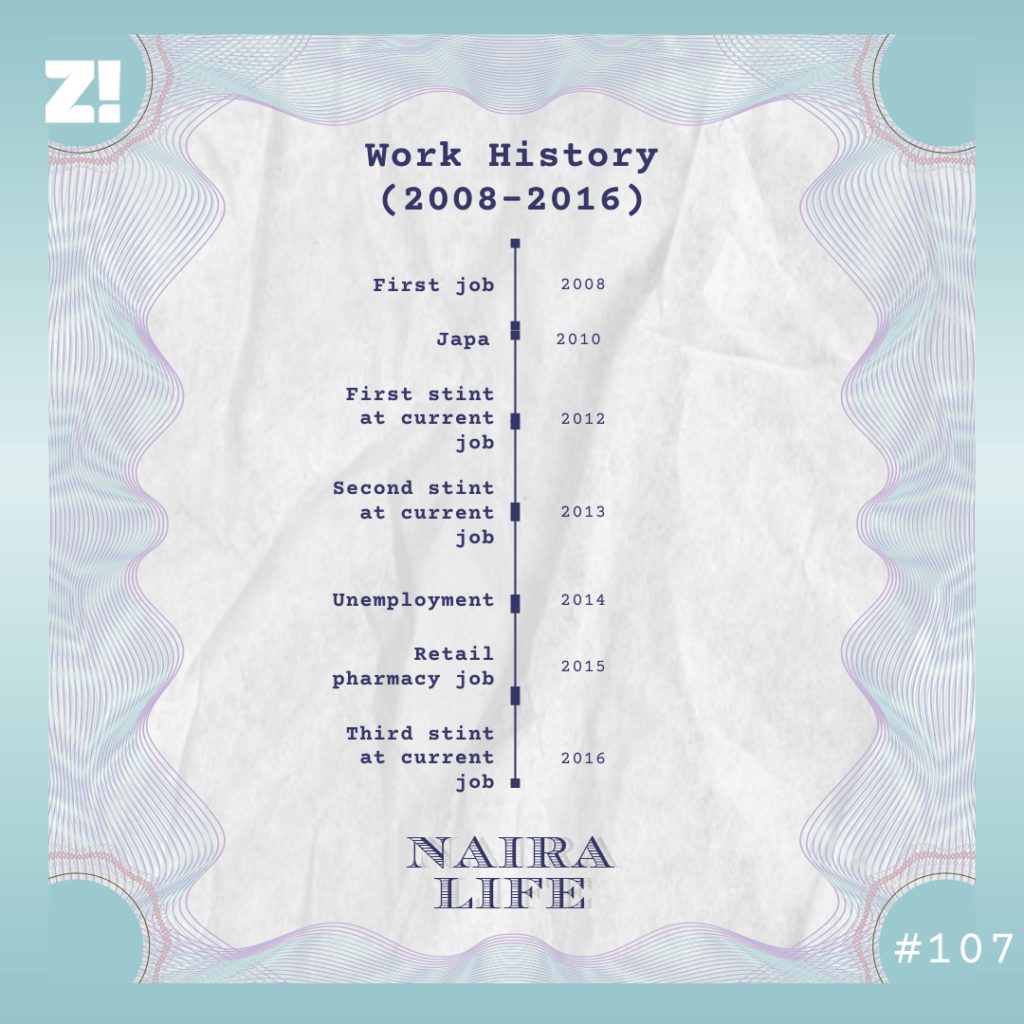
Flex. You were in a tough spot about three years ago. Has anything changed about how you move money in and out of your life?
After I got out of that relationship in 2018, I looked around and couldn’t point to any asset or investment I owned. Yet I’d been working since 2008. I thought about the kind of life I wanted to live after retirement, and I was nowhere close to it. Also, I started listening to this personal finance show and people would call in and talk about being 60 or 70 years old and in debt. These stories hit home. Like, this is what my life could potentially be like if I don’t get serious with my finances.
I went back to the basics and started with a budget. I hold a budget meeting with myself every month now and plan around what I have coming in. I try to put money for utilities aside two months before they’re due.
The rest goes into things like food, transport, health, housekeeping and other fees. My day-to-day expenses are in West African Franc and stack up to CFA 1.5M per month. The major expense I currently have in naira is the ₦150k I send to my parents every month.
I do another review at the end of the month and look at how much I spent the previous month, what I spent it on and how every purchase made me feel.
Do you have some savings now?
Yes. But If you’d asked me this question two days ago, I would tell you that I have $15k. I looked at my debt profile and almost had a panic attack. I had $10k debt on my credit card only. I closed my eyes and paid it off. Now, I have $5k in my emergency fund.
What other debt are you trying to pay off?
My student loans oh. I owe the US government $52k. I intend to clear it later this year.
Oof. What about investments?
In 2018, I started putting $6k in a personal retirement account. I have $18k in it now. I also have a pension fund at work and my employer matches what I have in it. That’s currently $140k. I have some shares in some banks in Nigeria, but the dividends are not a lot, so I don’t think about it.
What I need to hack this year is other investment options. I have no idea how those things work. I’m speaking to a financial planner later to help me figure it out.
Do you think about retirement a lot?
I do. That’s one of the reasons I’m talking to a financial planner. I’ve done vibes and inshallah for most of my adult life and need to step it up. I’m currently putting 10-15% of my annual salary into my retirement accounts, but how do I get it up to like 25%? How many more years do I need to work now to retire in the best possible position? Those are the questions I’m hoping to answer this year.
How has your relationship with money over the years shaped your perspective about it now?
Money is a gift. If you have it, you’re only a steward and must use it properly. It’s also a finite resource. I’m afraid that I will wake up one day and all of it will be gone. Now, if you’re going to spend it, it should be to make yourself and the people around you happy and secure your future. I’m so big on the proper stewardship of money now. Every penny must count for something.
What was the last thing you bought that required serious planning?
The house I grew up in came up for sale in 2019, and my mum really wanted it. It was on the market for ₦33m and I bought it for her. My entire savings and more went into it. It brings in ₦1.1m in rent every year now because there are tenants, but that goes to my parents.
That’s lit. Is there an expense you wish you don’t have?
My student loans are a drag on my life. Imagine what I could do with $52k? I obsess about it a lot. I have to clear it out this year.
Anything you bought recently that improved the quality of your life?
It has to be the house. I can’t imagine my mum moving out of that place. She’s built a community in it. So yeah, that definitely made me happy. I also bought a car recently. Moving around in Abidjan is a struggle, so the $21k was worth it.
On a scale of 1-10, how would you rate your financial happiness?
I’m at a four. I look at all the things I should have done earlier but didn’t do and wonder how my financial decisions in the past 10 years will impact my life. I’m almost 40 now, and I probably earn more than most people my age, but there’s also a lot of regrets about all the things I didn’t do right.
Damn. That’s heavy. What would make this number higher?
Maybe when my investments hit about $500k. That will probably move me up to a 7. I obsess a lot about money these days. Also, I can’t wait to start thinking about my expenses in percentages. When all of this happens, I can now say that I’ve arrived.

